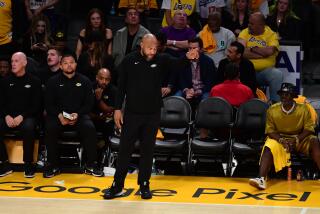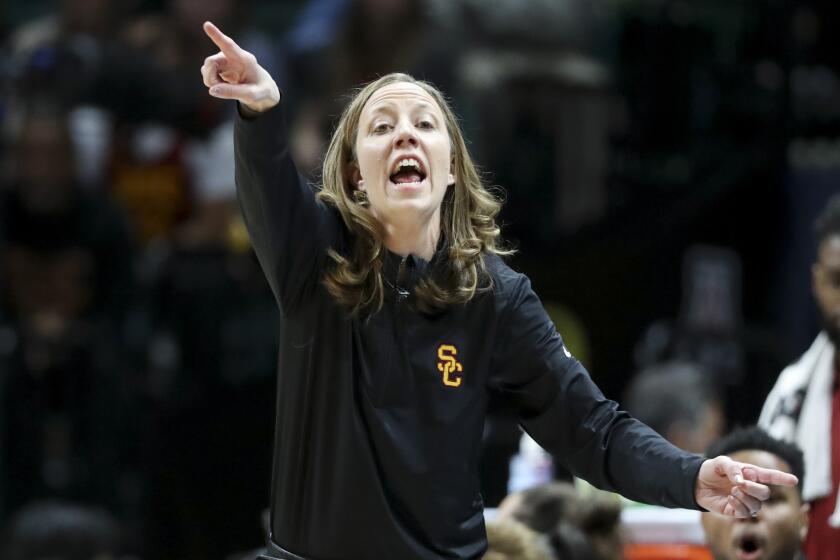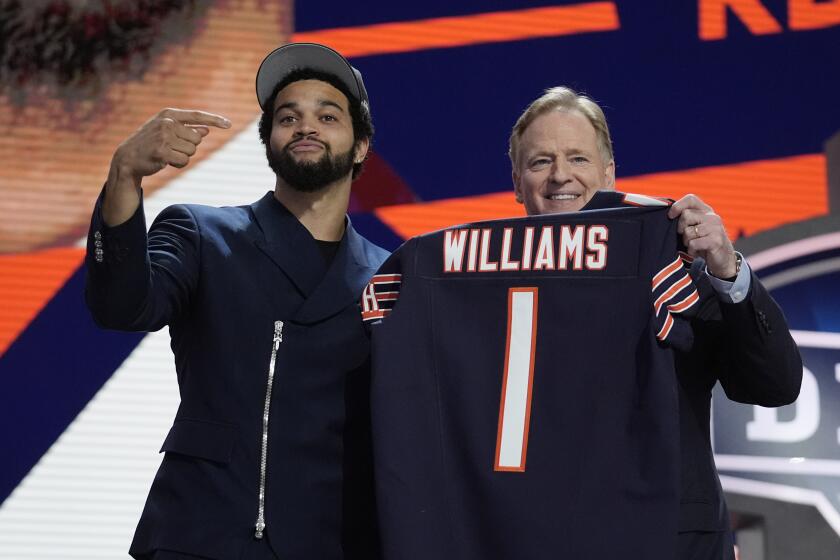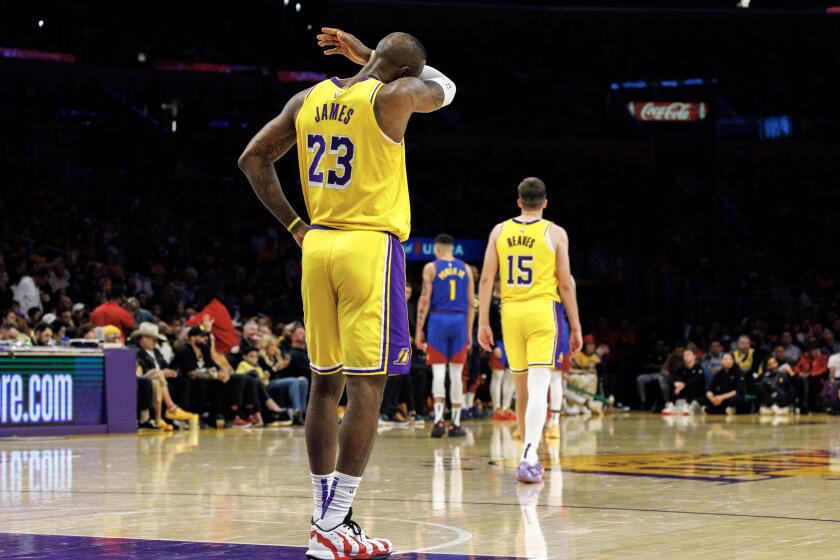Randy Walker, 52; Head Football Coach at Northwestern University
Randy Walker, the Northwestern University football coach whose training methods were scrutinized after the practice-field death of defensive back Rashidi Wheeler nearly five years ago, has died. He was 52.
The cause was an apparent heart attack. Walker experienced chest pains before dying Thursday night at his suburban Chicago home, a university spokesman said.
Walker’s death stunned a program that under his leadership shed its pre-1995 reputation as a college football laughingstock. Since Walker took over as coach in 1999, Northwestern regained stability by appearing in three college football bowl games. Northwestern rewarded Walker two months ago with a four-year contract extension through 2011.
“He was a spiritual leader on our team and worried about people’s integrity and character first and foremost,” Northwestern kicker Joel Howells said Friday at a tearful news conference on campus in Evanston, Ill.
Northwestern posted a 37-46 record under Walker, finishing 7-5 last season with a 50-38 loss to UCLA in the Sun Bowl. Northwestern shared the Big Ten Conference title in 2000 and advanced to the Alamo Bowl. The Wildcats also played in the 2003 Motor City Bowl.
Walker brought a hard-nosed, almost-militaristic reputation to Northwestern. In the days after Wheeler’s death, the coach said, “I have no doubt a better-conditioned athlete is a whole lot more likely to survive the game of football. I didn’t write the rules. But it is a rigorous sport.”
Wheeler, a 22-year-old La Verne Damien High graduate from Ontario, died Aug. 3, 2001, after he collapsed during a challenging set of wind sprints at a Northwestern practice field. In violation of NCAA rules for voluntary workouts, the sprints were being timed by an assistant to Walker, and the drill was described to players as a mandatory test that would have playing-time repercussions.
Walker did not attend the workout. When Wheeler collapsed in the throes of what the Cook County coroner identified as a fatal exercise-induced bronchial asthma attack, trainers on the field were late in summoning emergency help and failed to identify the asthma symptoms.
“I am beyond sorry,” Walker told The Times in an interview five days after Wheeler’s death. “Sorrow and grief doesn’t begin to express it.... I know ultimately it all ends up on my desk.”
No one was more enraged at Walker than Wheeler’s mother, Linda Will, who maintained, even after Northwestern was ordered to pay a $16-million wrongful death settlement to Wheeler’s survivors last year, that the coach be fired for what she described as his fatal neglect.
In a deposition, Will told Walker, “You murdered my son.”
Will did not return telephone calls to her Ontario home Friday seeking comment.
“Linda isn’t happy with how the university treated her son, but I can’t see any way Linda would take glee in someone dying,” David Novoselsky, Will’s Chicago-based attorney, said Friday.
Tom Demetrio, attorney for Wheeler’s father, George Wheeler Jr., said, “The buck always stops with the main guy, but in fairness to Walker, maybe if he had been at that practice, he would have responded to seeing Rashidi more aggressively and appropriately than what the others did.
“A man [Walker] has died, and left a widow and two kids. We all feel bad about that.”
Northwestern Athletic Director Mark Murphy, who was hired three years ago, said Wheeler’s death and the lawsuit that followed were difficult for Walker: “First of all having a player die, the media attacks. As it dragged on, it became more and more difficult.”
Walker checked himself into a hospital in October 2004 after experiencing chest pains. He was diagnosed with myocarditis, an inflammation of the heart muscle. The condition is not common and is usually caused by a virus.
He was out of the hospital in two days and said he was taking a new approach to his diet and work schedule.
“I’ve really taken my doctor’s orders to heart, because frankly, I want to see my grandkids someday,” he said.
Walker was born May 29, 1954, in Troy, Ohio. He was a college fullback in the 1970s at Miami University in Ohio, where he earned a bachelor’s in social studies education and a master’s in education administration. He was drafted by the Cincinnati Bengals but didn’t play long in the pros. He later took over the coaching reins of his alma mater and led the university to a 59-35-5 mark capped by a 10-1 record in 1998.
Walker is survived by his wife, Tamara, and two children, Abbey, 28, and Jamie, 25, who is the school’s football recruiting assistant.
*
The Associated Press contributed to this report.
More to Read
Get our high school sports newsletter
Prep Rally is devoted to the SoCal high school sports experience, bringing you scores, stories and a behind-the-scenes look at what makes prep sports so popular.
You may occasionally receive promotional content from the Los Angeles Times.







